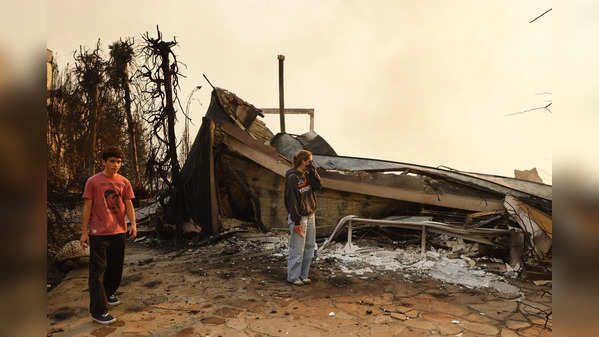When wildfires ravage more than just homes, parents are left to guide their children through a complex emotional maze. From comforting toddlers to explaining loss to older kids, here’s how to help kids understand and cope with the aftermath of the fires in L.A.
The Toughest Conversation: Telling Kids About Loss
After evacuating her Altadena home, Tanya Reyes had to break the news to her daughters, ages 3, 6, and 8, that their house was gone. While the youngest wondered about her toy kitchen, and the middle one about her stuffed animals, the oldest began writing in her journal. Breaking the news is a heavy burden on families, and for parents, it requires a delicate balance of honesty and support.
Children cannot see the whole magnitude of loss, but they feel the emotions that surround them. It is therefore important that parents give them truthful, age-related explanations to let their children know they are safe and loved in the midst of all the chaos. The conversations continue; there is no "right" way to talk about a tragedy, but there is consistency that can be used to reassure them and validate the feelings.
Tiny Terrors: Helping Babies and Toddlers Cope
When wildfires create chaos, babies and toddlers may not understand what’s happening, but they certainly feel the fear and uncertainty of their parents. Joey Kehoe’s one-year-old daughter Florence didn’t have the words to express her fear after the fire, but her clinginess and distress spoke volumes. Babies may not process the details, but they’re attuned to the emotions in the air, making them extra sensitive.
For the tiniest victims of a disaster, keeping a calm presence, maintaining routines, and offering comfort through familiar activities like singing or playing is key. Parents should regulate their own emotions to help soothe their little ones and provide a sense of safety amidst the turmoil.
Preschool Panic: What to Say to Little Kids
Kehoe’s 4-year-old daughter is struggling to process the loss of their home, and her somber behavior speaks to the deeper confusion she’s experiencing. Preschool-aged children need straightforward explanations, but parents should avoid overwhelming them with too much detail. For instance, saying “We had to leave because of a big fire, but we’re safe now” can help them grasp the situation without causing unnecessary anxiety.
Behavioral changes like clinginess, night wakings, or picky eating are common in young children after trauma. It’s essential to offer reassurance and let them feel the security of their parents. And if they want to sleep in your bed for a while or eat pasta every night, it’s okay to say yes—this is a time for comfort, not rules.
The Social Media Generation: Talking to Elementary Kids
When Tanya Reyes' 8-year-old daughter repeatedly watched footage of their home burning, it signaled the beginning of a complex emotional journey. For older children, especially those with access to social media, navigating the information and emotions around such a tragedy can be challenging. Parents need to step in, limit exposure to distressing images, and correct misinformation that children may encounter.
Reassuring kids that it’s okay to feel sad, scared, or even confused is essential. Establishing normal routines—bedtimes, meals, and school schedules—helps create a sense of stability. However, kids may process the experience in different ways, from anxiety to excitement or even detachment. Open communication is crucial in helping children understand their emotions, and for parents, patience is key in allowing children to express themselves over time.
Back to Basics: The Need for Stability Amid Chaos
For families displaced by the fires, returning to normal routines can be a beacon of hope. Cody Whitman’s daughters, ages 8 and 10, haven’t cried yet, but they’re already asking questions about the fire’s origin. Their experience, like so many others, includes the surreal feeling of loss mixed with curiosity about what happened. In the weeks ahead, the emotional impact of the fires will likely surface in more profound ways.
Providing a sense of stability, whether it’s finding a temporary place to stay, enrolling children in a new school, or simply having family dinners, is crucial to helping kids recover. Acknowledging their feelings, no matter how they manifest, and creating an environment where they feel supported will allow them to gradually process the trauma of the fire.
